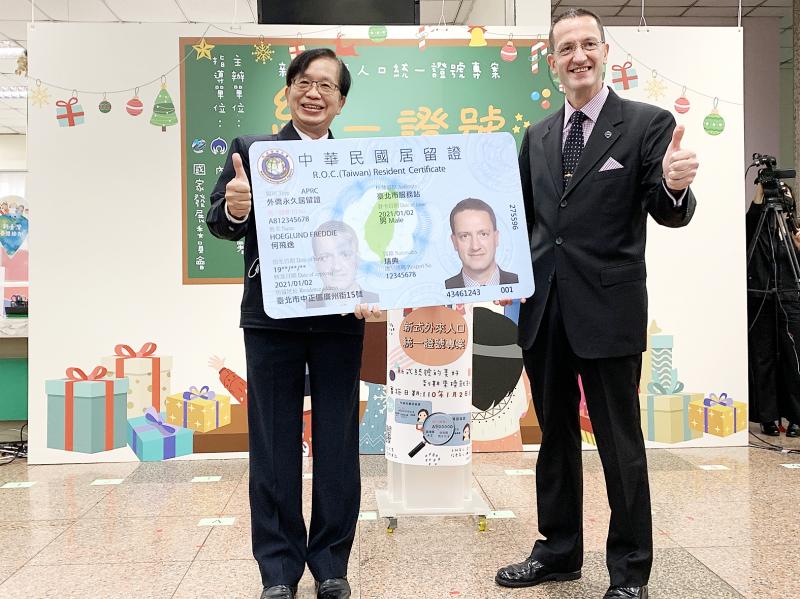A plan to change the numbering system for Alien Resident Certificates (ARC) and Alien Permanent Resident Certificates (APRC) — so they have the same format as Republic of China national identification cards — was yesterday praised by foreign chamber representatives, who said it would make their lives in Taiwan more convenient.
“The policy makes more people feel that Taiwan is their home,” AmCham Taipei president Leo Seewald told the National Immigration Agency’s promotional event.
Starting on Jan. 2, the numbers on ARC and APRC cards, which are now two letters and eight digits, would be changed to one letter and nine digits.

Photo: CNA
The new measure would enable foreign residents in Taiwan to make online purchases, book tickets, and register online, all of which can be challenging due to the current numbering differences.
Calling the inconsistent card numbering an issue of “sustainability and prosperity,” Seewald said the problem has been continuously raised by its members in the chamber’s annual business climate survey.
The European Chamber of Commerce Taiwan has been studying the issue since 2010, chief executive Freddie Hoeglund said, adding that he is happy to see it resolved.
“It will provide us easier access to e-commerce platforms,” Hoeglund said.
However, some time would be needed to ensure that the program is running well, Hoeglund added.
While redesigned information systems of government agencies are likely ready to go, the private sector might need more time to adapt to the changes, he said.
The change would affect about 871,006 ARC holders and 20,408 APRC holders, National Immigration Agency statistics showed.

‘CORRECT IDENTIFICATION’: Beginning in May, Taiwanese married to Japanese can register their home country as Taiwan in their spouse’s family record, ‘Nikkei Asia’ said The government yesterday thanked Japan for revising rules that would allow Taiwanese nationals married to Japanese citizens to list their home country as “Taiwan” in the official family record database. At present, Taiwanese have to select “China.” Minister of Foreign Affairs Lin Chia-lung (林佳龍) said the new rule, set to be implemented in May, would now “correctly” identify Taiwanese in Japan and help protect their rights, the Ministry of Foreign Affairs said in a statement. The statement was released after Nikkei Asia reported the new policy earlier yesterday. The name and nationality of a non-Japanese person marrying a Japanese national is added to the

AT RISK: The council reiterated that people should seriously consider the necessity of visiting China, after Beijing passed 22 guidelines to punish ‘die-hard’ separatists The Mainland Affairs Council (MAC) has since Jan. 1 last year received 65 petitions regarding Taiwanese who were interrogated or detained in China, MAC Minister Chiu Chui-cheng (邱垂正) said yesterday. Fifty-two either went missing or had their personal freedoms restricted, with some put in criminal detention, while 13 were interrogated and temporarily detained, he said in a radio interview. On June 21 last year, China announced 22 guidelines to punish “die-hard Taiwanese independence separatists,” allowing Chinese courts to try people in absentia. The guidelines are uncivilized and inhumane, allowing Beijing to seize assets and issue the death penalty, with no regard for potential

‘UNITED FRONT’ FRONTS: Barring contact with Huaqiao and Jinan universities is needed to stop China targeting Taiwanese students, the education minister said Taiwan has blacklisted two Chinese universities from conducting academic exchange programs in the nation after reports that the institutes are arms of Beijing’s United Front Work Department, Minister of Education Cheng Ying-yao (鄭英耀) said in an exclusive interview with the Chinese-language Liberty Times (the Taipei Times’ sister paper) published yesterday. China’s Huaqiao University in Xiamen and Quanzhou, as well as Jinan University in Guangzhou, which have 600 and 1,500 Taiwanese on their rolls respectively, are under direct control of the Chinese government’s political warfare branch, Cheng said, citing reports by national security officials. A comprehensive ban on Taiwanese institutions collaborating or

STILL COMMITTED: The US opposes any forced change to the ‘status quo’ in the Strait, but also does not seek conflict, US Secretary of State Marco Rubio said US President Donald Trump’s administration released US$5.3 billion in previously frozen foreign aid, including US$870 million in security exemptions for programs in Taiwan, a list of exemptions reviewed by Reuters showed. Trump ordered a 90-day pause on foreign aid shortly after taking office on Jan. 20, halting funding for everything from programs that fight starvation and deadly diseases to providing shelters for millions of displaced people across the globe. US Secretary of State Marco Rubio, who has said that all foreign assistance must align with Trump’s “America First” priorities, issued waivers late last month on military aid to Israel and Egypt, the